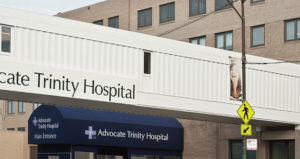Advocate Aurora Health Part of Long-Term Efforts to Achieve Health Equity on Chicago’s South Side

Advocate Aurora Health’s Advocate Trinity Hospital is one of four hospitals on Chicago’s South Side working toward health equity.
UCC-related Advocate Aurora Health — based in Downers Grove, Ill. And Milwaukee, Wis. — is helping lead the way to increased health equity for residents of Chicago’s South Side. The health system’s Advocate Trinity Hospital has signed a nonbinding agreement with three other area hospitals — Mercy Hospital and Medical Center (a member of Trinity Health), South Shore Hospital, and St. Bernard Hospital — to create a new, independent health care system dedicated to reimagining health for area residents.
The new model “focuses on providing critical health care delivery services and on proactive engagement around the social conditions that impact people’s health,” says the Rev. Bonnie Condon, vice president for community health, community relations, and faith outreach for Advocate Health Care.
For decades, residents of Chicago’s South Side have faced significantly lower life expectancies and higher incidences of chronic disease, which is exacerbated by food and housing insecurity, and trauma. Despite efforts on local and state levels, the rates have not improved. “The status quo isn’t effectively serving our patients or our community,” Condon says. “Advocate chose to be part of this effort because the new system offers an opportunity to better coordinate care, improve health outcomes, attract and retain clinicians, spur economic development, and establish financial security for years to come.”
The multi-year plan to improve the health status of patients in the community will include an investment of $1.1 billion over the next decade that will increase net jobs in the region and expand access to quality primary and preventive care services.
“Over the next several years, the new health care system will build vibrant community health centers and at least one new, state-of-the-art destination hospital to replace aging facilities,” Condon adds. Additionally, “there is a robust community input process that will help shape how the health care system delivers care.”
Part of that process includes community health needs assessments and service area data, especially those that address access to nutritious food, stable housing and steady employment. The four hospitals also are asking neighborhood leaders and area residents to participate in a series of community input sessions to help shape solutions tailored specifically to their needs.
Advocate Aurora Health will continue its community-based Faith Community Nurse program in the local neighborhood, and will be an active partner in the community. It looks toward a future filled with hope for health equity for area residents.
“The visionary leaders of these hospitals were willing to give up their identities and status as health care organizations to create a new model that is rooted in getting state of the art health care services in to the neighborhoods where people live,” says Condon.
In addition to increasing job opportunities, the group is committed to ensuring new facilities open before any existing facilities close, and to re-deployment and re-training programs that are reflective of the growing health care jobs of the future. They will seek significant private philanthropic involvement to support the new system and help achieve health equity for the affected communities.
“This is the right thing to do for those we serve,” said Rashard Johnson, president of Advocate Trinity Hospital. “We have a moral obligation to address health equity and that requires a transformational approach to how, when and where we deliver care.”
Join Our Mailing LIst
"*" indicates required fields
Follow on Facebook
New Resident Finds Belonging at Emmaus Homes - CHHSM
www.chhsm.org
Heather’s journey toward independence has been nothing short of inspiring. Since moving into her new home last year, Heather’s world has expanded in ways she never imagined. Leaving the familiarit...